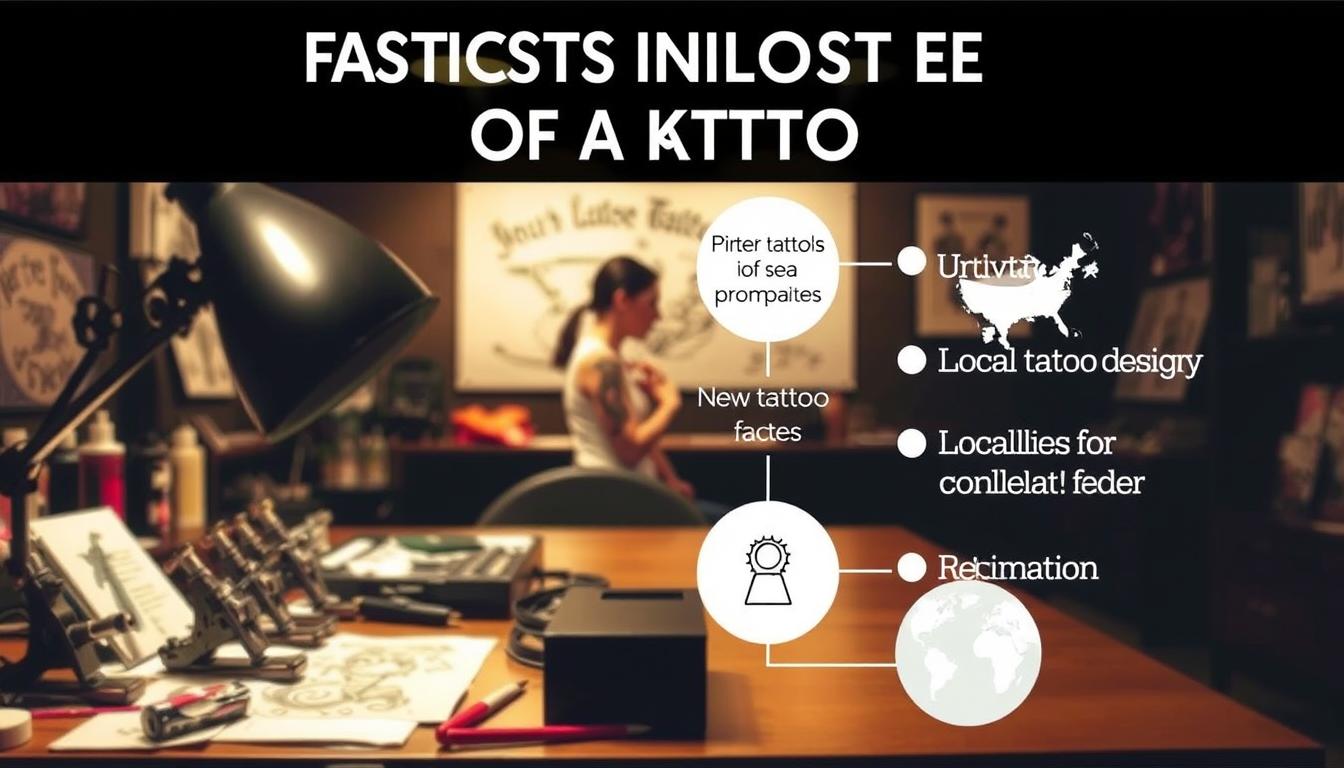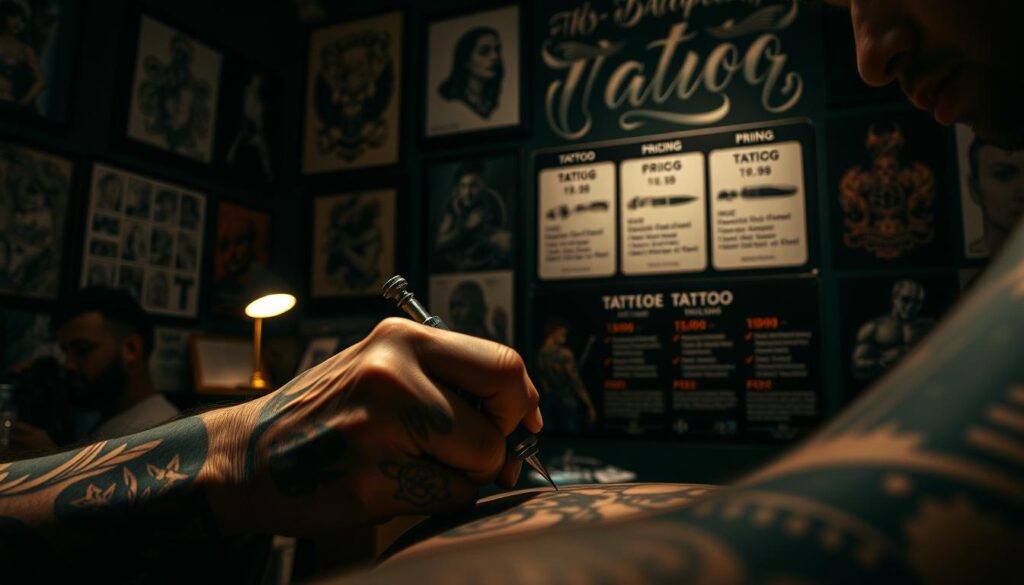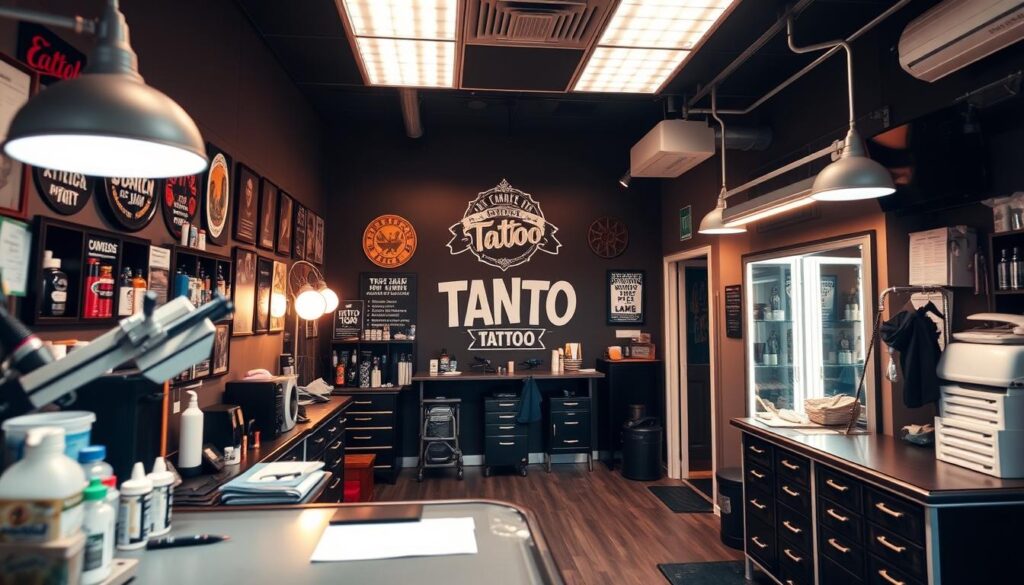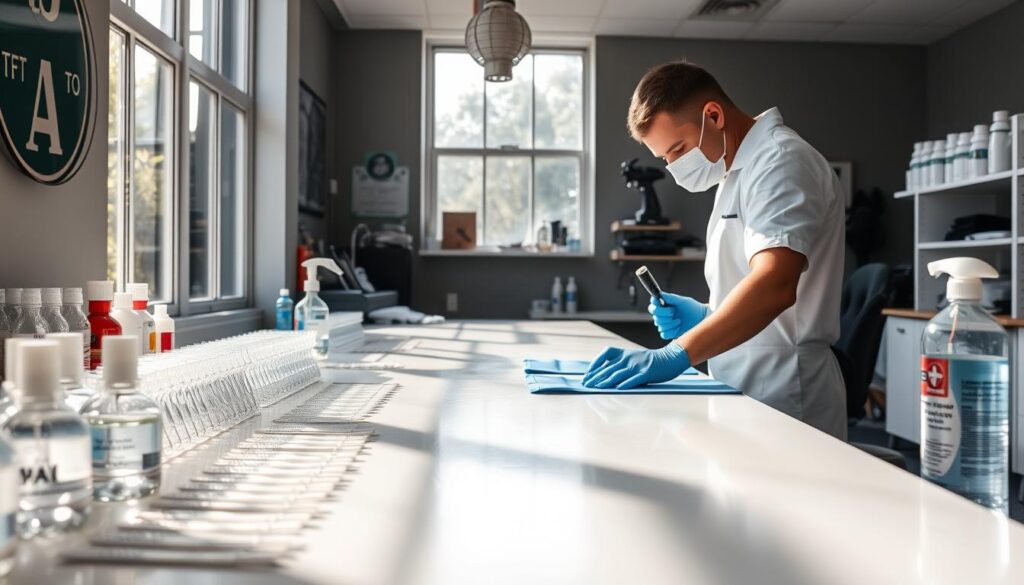
Thinking about getting a tattoo? You might wonder about the tattoo prices. The cost can change a lot. It depends on size, how detailed it is, the artist’s skill, and where you get it.
Tattoos are now a big way to express yourself. Knowing what affects the cost of tattoos is key. These factors can really change the price of your tattoo. For more tips on starting your tattoo journey, check out our related article.
Key Takeaways
- Size and complexity are key factors in determining tattoo prices.
- Artist experience and reputation can significantly impact the cost.
- Location plays a big role in tattoo pricing because of different living costs.
- Understanding these factors can help you budget for your tattoo.
- Choosing the right artist is key for a great tattoo.
Understanding Tattoo Pricing Basics
Getting a tattoo involves understanding its cost. The price depends on several factors. Knowing these helps you make a smart choice.
Factors Influencing Tattoo Costs
Several things affect tattoo prices. These include the size and detail of the tattoo. Also, the placement on the body, the artist’s experience, and the studio location play a role. For example, a big tattoo with lots of details costs more than a small, simple one.
The body area where you get the tattoo also matters. Places like the ribs or feet are harder to tattoo. This makes them more expensive. You can learn more about these factors by checking out related resources.
Common Pricing Structures
Tattoo artists charge in two main ways: hourly rates or flat fees. Hourly rates change based on the artist’s skill and the studio’s location. Flat fees give you a clear price upfront.
When you talk to a tattoo artist, they’ll look at your design and give you a quote. It’s important to talk about the pricing. This way, you know what you’re paying for and avoid surprises.
Average Costs for Different Tattoo Sizes
The size of your tattoo greatly affects its price. Larger tattoos usually cost more. Tattoo artists consider the design’s complexity and size when setting prices.
Small Tattoos
Small tattoos are perfect for those who prefer a subtle look. They can be simple symbols or detailed designs. Prices vary based on the design’s intricacy.
Small tattoos typically cost between $50 and $200. A small heart tattoo on the wrist might be around $75. A detailed design on the ankle could be closer to $150.
Medium Tattoos
Medium-sized tattoos offer design flexibility and can be placed almost anywhere. They’re a good choice for those who want a noticeable tattoo without it being too big.
Medium tattoos usually cost between $200 and $500. A medium tattoo on the forearm might cost around $300, depending on the design’s complexity.
Large Tattoos
Large tattoos are for making a bold statement. They can be detailed designs covering significant body parts like the back, chest, or sleeves.
Large tattoos are quite pricey, with costs ranging from $1,000 to $5,000 or more. For example, a full-color sleeve tattoo can cost over $3,000.
| Tattoo Size | Average Cost Range | Examples |
|---|---|---|
| Small | $50 – $200 | Small heart on wrist: $75, detailed ankle tattoo: $150 |
| Medium | $200 – $500 | Forearm tattoo: $300 |
| Large | $1,000 – $5,000+ | Full-color sleeve: $3,000+ |
Knowing these price ranges helps plan your tattoo budget better. Remember, these are general estimates. Actual costs can vary due to the artist’s experience and the studio’s location.
The Role of Tattoo Artist Experience in Pricing
When planning your tattoo, knowing how an artist’s experience affects price is key. The experience and reputation of a tattoo artist greatly influence your tattoo’s cost.

Beginner vs. Experienced Artists
Tattoo artists come with different levels of experience and skill. Beginner artists just starting out usually charge less. They offer discounted rates to attract clients and grow their portfolio.
Experienced artists with a strong reputation and quality work charge more. Their pricing shows their expertise, the quality of their work, and the demand for their services.
Choosing between a beginner and an experienced artist depends on your tattoo’s design. For complex or large designs, an experienced artist might be worth the extra cost for their quality work.
Specialization and Niche Artists
Some tattoo artists specialize in certain styles, like realism or traditional tattoos. Specialization can raise prices, as artists with unique skills or fame in a style may charge more. If your design needs a specific skill, be ready for higher costs.
- Niche artists may charge more due to their specialized skills.
- Custom designs often require more time and expertise, affecting the price.
- Researching and comparing artists can help you find the best value for your money.
Understanding these factors helps you choose the right tattoo artist. This ensures you get the quality you’re paying for.
Geographic Location and Its Impact on Tattoo Prices
Where you live affects how much you’ll pay for a tattoo. Prices change a lot depending on if you’re in a city, town, or suburb.
Urban vs. Rural Pricing
Tattoo prices vary a lot between cities and rural areas. Places like San Francisco and New York charge more because of high demand and living costs. But, rural spots often have lower prices because of lower costs and less demand.
If you want cheap tattoos, rural areas might be a good choice. But, remember to check the tattoo artist’s quality and reputation too.
Regional Variations
Prices also change based on where you are in the country. Different places have different living costs and tattoo demand. For example, areas with lots of tattoo studios might have better prices because of competition.
| Location | Average Cost for Small Tattoos | Average Cost for Medium Tattoos | Average Cost for Large Tattoos |
|---|---|---|---|
| Urban Areas | $100-$300 | $300-$600 | $600-$1,200 |
| Rural Areas | $60-$200 | $200-$400 | $400-$800 |
Before getting a tattoo, look up the cost of tattoos in your area. Also, think about the tattoo artist’s reputation and skill. While cost matters, it shouldn’t be the only thing you think about.
Tattoo Styles and Their Associated Costs
The style of your tattoo greatly affects the price. It’s important to know the cost of different styles. This knowledge helps you make a smart choice when getting a tattoo.
Traditional Tattoos
Traditional tattoos are known for bold lines and bright colors. They often include designs like anchors, roses, and skulls. The price depends on the design’s size and detail.
A small traditional tattoo might cost between $50 to $200. Larger ones can range from $200 to $500 or more. For more details, visit a reputable tattoo artist’s website.
Realistic and Portrait Tattoos
Realistic and portrait tattoos need a lot of skill and detail. They aim to look like real images or portraits. This makes them more expensive.
The cost can range from $500 to $2,000 or more. It depends on the size and detail. The artist’s experience also affects the price.
Abstract and Custom Designs
Abstract and custom tattoos are unique and personal. They are detailed and require a lot of time and creativity. This makes them more expensive.
Prices can vary from $300 for simple designs to $1,500 or more for complex ones. The level of customization and the artist’s skill are key factors.
In conclusion, the style of your tattoo is key to its cost. Knowing the prices of different styles helps you plan your budget. Whether it’s traditional, realistic, or abstract, talking to a professional tattoo artist is essential for an accurate quote.
The Importance of Tattoo Studio Reputation
Choosing a tattoo studio with a good reputation is key for a safe and satisfying tattoo experience. The studio’s reputation can greatly affect the tattoo’s quality and cost.
How Reputation Affects Cost
Reputable tattoo studios usually charge more. This is because they have experienced artists and top-notch equipment. The cost covers the studio’s investment in cleanliness, quality ink, and skilled artists.
Choosing a reputable studio means more than just the tattoo price. It’s about the expertise and knowing you’re in good hands. For example, a famous studio might cost more because of its high service quality.

Choosing a Trusted Studio
To find a trusted studio, look at these factors:
- Read online reviews and testimonials to see how clients feel.
- Make sure the studio follows health and safety rules.
- Check their portfolio to see the quality and consistency of their work.
- Get tattoo price quotes from different studios to compare.
By doing these things, you can choose an affordable tattoo shop that’s also high-quality.
| Studio Characteristic | Impact on Cost | Reputation Indicator |
|---|---|---|
| Experienced Artists | Higher cost due to expertise | Positive reviews, portfolio quality |
| High-Quality Equipment | Increased cost due to premium materials | Cleanliness, modern equipment |
| Client Service | Reflects in overall pricing | Client testimonials, referrals |
Even if a reputable studio costs more upfront, the long-term value and satisfaction are worth it. By focusing on studio reputation, you get a great tattoo experience.
Additional Costs to Consider Beyond the Tattoo
Getting a tattoo is more than just the art itself. You also need to think about aftercare costs. This ensures your tattoo heals well and looks great.
Aftercare Products
Aftercare products are key for your tattoo’s health. Your artist will suggest creams, ointments, or lotions. These can cost between $20 to $50 during healing.
They might also suggest special soaps or washes. It’s important to use these to heal right and avoid problems.
Touch-Up Sessions
Touch-ups might be needed for your tattoo. They keep the design bright and complete. The cost varies based on the artist and the work needed.
Touch-ups usually cost $50 to $200. This depends on the design’s complexity and the time needed.
Tips for Tattoo Artists
As an artist, guiding clients on aftercare is vital. Offer product suggestions and clear instructions. This helps your clients get the best results and builds trust.
Trust leads to more business and referrals. It’s a win-win for everyone.
Custom Designs vs. Flash Tattoos
Custom designs and flash tattoos are two different ways to get a tattoo. They have different prices and ways to express yourself. Knowing the difference helps you choose what fits your style and budget.
What Are Flash Tattoos?
Flash tattoos are designs already made by tattoo artists. They are ready-made designs shown in tattoo studios or books. These designs range from simple to complex and are often priced lower than custom ones.
Cost Differences
Custom designs cost more than flash tattoos. This is because custom designs take more time and creativity from the artist. Flash tattoos, being pre-made, are cheaper.
| Tattoo Type | Average Cost | Customization Level |
|---|---|---|
| Custom Designs | $100-$500+ | High |
| Flash Tattoos | $50-$200 | Low to Medium |
Flash tattoos are great for those on a budget or looking for inspiration. But, if you want something truly unique, a custom design might be better. You can find tattoo ideas on websites like nailcutandink.com, even if it’s for nail art.
Health and Safety Standards and Their Costs
Tattoo studios focus on health and safety. These steps can raise the price you pay. Keeping the place clean and safe is key to protecting everyone involved.
Licensing and Regulations
Studios must follow local health rules. These rules require special licenses. These licenses make sure studios are clean and staff is trained.
Licensing rules differ by place. They cover things like:
- Proper sterilization techniques
- Safe disposal of needles and other hazardous materials
- Regular health inspections
Importance of Sanitation
Sanitation is vital in tattoo studios. It stops infections and keeps the place clean. Studios spend on good sanitation gear and staff training.
Some key sanitation points include:
- Using autoclaves for sterilizing equipment
- Implementing strict hygiene protocols for artists and clients
- Regularly cleaning and disinfecting the studio

Choosing a studio that values health and safety is smart. It keeps you safe and ensures your tattoo is top-notch. Even though it costs more, it’s worth it for a great tattoo experience.
Discounts and Promotions
You don’t have to spend a lot to get a great tattoo. Many tattoo studios offer discounts and loyalty programs. They do this to attract new clients and thank loyal ones.
Finding Deals on Tattoos
To find tattoo deals, start by looking up local tattoo studios and their promotions. Check their websites, social media, and sign up for newsletters. This way, you’ll know about upcoming deals. Also, keep an eye out for tattoo conventions and events in your area. Artists often give discounts there.
Some common deals include:
- Discounts for first-time clients
- Special rates for specific designs or styles
- Package deals for multiple tattoos
As one tattoo artist says,
“We love rewarding our loyal clients and attracting new talent with our promotions. It’s a win-win for everyone.”
Loyalty Programs and Referrals
Loyalty programs and referrals can also help you save. Many studios give discounts to clients who refer friends. They see it as a way to thank you for your loyalty.
Here are some benefits you might enjoy:
- Discounts on your next tattoo
- Free aftercare products
- Priority booking for appointments
By using these discounts and promotions, you can get a tattoo without breaking the bank. Always ask your tattoo studio about their current offers and loyalty programs.
Understanding the Tattoo Consultation Process
A tattoo consultation is more than just a meeting. It’s a detailed talk about your tattoo design and its cost. You and your tattoo artist will discuss your design ideas, the tattoo’s size, and other important factors that affect the cost.
What Happens During a Consultation?
Your artist will ask about your design preferences and what inspired your tattoo. They will also talk about your expectations. They will look at the design’s complexity, size, and where you want it on your body. This helps them give you a precise quote for the tattoo.
Key elements discussed during a consultation include:
- Design specifics and customizations
- Tattoo size and its impact on cost
- Placement and its effect on pricing
- Color vs. black and gray tattoos
Cost Implications of Design Changes
Design changes can greatly affect your tattoo’s final cost. Simple designs are often cheaper, while complex ones cost more because they take more time and detail.
Here’s a breakdown of how design changes can impact costs:
| Design Change | Potential Cost Impact |
|---|---|
| Adding colors | Increased cost due to additional ink and time |
| Simplifying the design | Potential reduction in cost due to less complexity |
| Increasing the size | Increased cost due to more ink and longer session times |
Understanding these factors during your consultation helps you make smart choices about your tattoo design and budget.
Planning Your Tattoo Budget
Planning your tattoo budget is key to getting the design you want without overspending. A good budget helps you choose the right size, complexity, artist, and studio. It’s all about making smart choices.

Setting a Realistic Budget
To set a realistic budget, think about several things. The size, complexity, and location of your tattoo matter. Bigger and more detailed tattoos cost more because they take longer to do.
Also, look up the average tattoo prices in your area. This helps you know what to expect.
Here are some tips for a realistic budget:
- Research the average cost of tattoos in your area.
- Consider the size and complexity of your design.
- Factor in the cost of aftercare products and touch-up sessions.
- Save money by opting for a smaller design or a simpler style.
Saving for Your Next Tattoo
Saving for your tattoo takes discipline and patience. But with a good plan, you can reach your goal. Start by setting aside a fixed amount each month. You might even want to open a special savings account just for your tattoo fund.
Here are some ways to save for your next tattoo:
- Create a savings plan with a specific target amount.
- Automate your savings by setting up monthly transfers.
- Cut back on unnecessary expenses to free up more money for your tattoo.
- Consider taking on a side job or selling items you no longer need to boost your savings.
By planning your tattoo budget and saving carefully, you can enjoy your new tattoo without worrying about money.
How to Avoid Overpaying for Tattoos
To avoid overpaying for tattoos, it’s key to do your homework. Knowing what affects tattoo prices helps you make smart choices. This way, you can save money and avoid financial loss.
Researching and Comparing Prices
Looking up tattoo studios and artists is a must. Check their work, read reviews, and ask people you trust for advice. By comparing prices and services, you’ll understand the average cost for your tattoo.
When you research, think about:
- The tattoo artist’s experience and reputation
- The size and detail of your tattoo design
- The tattoo studio’s location
- The studio’s cleanliness and safety
Red Flags to Watch For
Also, keep an eye out for red flags. Studios that are much cheaper might not be experienced or use good equipment.
Some red flags include:
- Poor cleanliness and sanitation
- Not being clear about prices or the tattoo process
- Not willing to talk about the tattoo or answer questions
- Poor online reviews or no portfolio
By knowing these red flags and doing your research, you can avoid overpaying. You’ll also get a safe and quality tattoo experience.
Making an Informed Decision
Getting a tattoo is a big deal. Being well-informed helps you feel confident as you go through the process. It’s important to think about several key things that will affect your experience.
Asking the Right Questions
Asking the right questions is a big step. You should ask about the tattoo artist’s experience and the studio’s cleanliness. Also, find out about the costs and see the artist’s work. This helps you know if they’re right for you.
For example, you might ask about their experience with custom designs. Or how they handle changes to your design. Exploring different styles, like a Portuguese cut diamond, can also guide your choice.
Trusting Your Instincts
It’s also key to trust your gut. Notice how the tattoo artist and studio make you feel. Do they seem professional and friendly? Do they answer your questions well?
If something doesn’t feel right, it’s okay to look elsewhere. Listening to your instincts ensures you’ll be happy with your tattoo choice.
In short, making a good tattoo decision involves research, asking questions, and trusting your instincts. By doing your homework, you’ll likely get a tattoo you’ll love for years.
Conclusion: Embrace Your Tattoo Journey
Learning about tattoo costs is just the start. You’ve discovered how many things affect tattoo prices. This includes the artist’s skill and the studio’s reputation.
Now, you know what to look for in a tattoo. Your unique style is worth the cost. With the right artist and studio, your tattoo will be a lasting part of you.
Permanent Art on Your Skin
Your tattoo is a lasting way to express yourself. It shows who you are, what you value, and your life experiences.
Embracing Your Individuality
Remember, your tattoo is a personal choice. Take your time and don’t rush. With patience and the right advice, you’ll find the perfect tattoo that shows your unique style.
